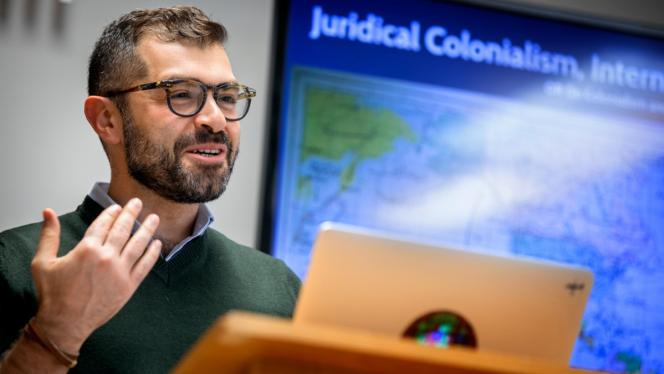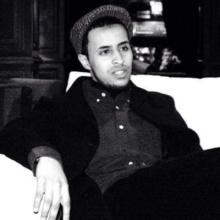Thursday 21 November 2024
“If you don’t know your past, you can only stumble into the future”

Professor Minawi speaks to Geeska about the history of Ottoman empire, its role in Africa, and why it’s important to understand its role in our common history.
“I accidentally stumbled into the field of Ottoman studies,” says Mostafa Minawi. He initially studied civil engineering and whilst working at a bank decided to take night courses on Ottoman history in the evenings whilst living in Toronto. “It explained a lot of things that I did not wonder about in the past, it made a lot of sense on a personal level,” he told me in a video call. His great-grandfather, for example, was a member of the Ottoman army.
As he came to understand and later formally study Ottoman history, Professor Minawi was surprised to find the huge gap in public memory in the region about the role of the empire in the histories of the post-colonial states which emerged in the 20th century. “It is never talked about, we don’t really learn about it in schools in the Middle East and Turks are generally considered strangers in a neighbouring country.”
He laments the fact that this chapter is erased from public memory. In a recent piece for Al Jazeera English, he made a powerful appeal to increase literacy of the empire’s impact in the region arguing that: “The people of the region have been uprooted from their historical reality and left vulnerable to the false narratives of politicians and nationalist historians.”
Somalia is no different in that regard, he says, as the empire had at various times played a crucial role in the region’s history. Similar to neighbouring Arab countries, that history remains largely unexplored in modern Somalia.
He has since become a leading historian on the empire and has published two books. One on the empire’s role in the Scramble for Africa – The Ottoman Scramble for Africa (2016) – and a book charting the changing fortunes of an Arab-Ottoman family as the empire began falling apart in the early 20th century titled Losing Istanbul (2022). He is currently working on a book about the empire’s presence in northeast Africa.
Below is an interview with Professor Minawi about the empire, its role in Africa, and why it’s important to understand its role in our common history.
Faisal Ali (FA): Let us begin with your recent Al Jazeera article which has begun a lot of discussion about the Ottoman empire in the Middle East. Some have reacted with outrage, others have welcomed your call. Why did you feel the need to write that piece?
Mostafa Minawi (MM): I felt at this stage in my career that I was no longer just answering some academic questions I had about the Ottoman Empire and wanted to reach out to the public at large and share some of what I have been doing. A lot of this work has major implications for how these different countries see themselves and their place in the region, as well as the problems inherited from the European colonial era which persist to this day.
There is an old saying that if you do not know your past, you can only ever stumble in the dark into the future because you aren’t quite sure where you fit into the equation of how history has developed.
I wanted people to explore their history. Ottoman history in the Middle East is actually local history, and I want them to own it, to understand it and take control of how those stories are told.
FA: The Ottoman empire is depicted as an empire in peril as early as the 16th century, and certainly by the 19th century a lot of the literature suggests that the end was inevitable and even possibly imminent. Your first book however suggests that it was still expanding as late as the 18th century in Africa and competing with European empires. Can you tell us a bit about that?
MM: At the beginning, the Ottoman Empire didn’t have a continuous rise and it certainly did not have a continuous decline towards the end, even during the era when Western European empires emerged on the global scene. It went through ups and downs, had major successes and failures and it even attempted an ambitious reform project through the 19th century in what historians call the Tanzimat era (Tanzimat is Turkish for Reorganisation).
Whilst it is true that the empire stopped growing in Europe, to say it stopped expanding completely is a very eurocentric vision. In any case whether an empire is expanding or not shouldn’t be the measure of whether it is doing well or doing badly. But if we look at the 19th century the Ottoman empire entered the broader contest to gain subjects and control of territories in Africa with European empires. This is the so-called ‘Scramble for Africa’ which I wrote about from the Ottoman angle.
The Ottomans feared that if they didn’t enter that game, they would no longer be subjects in the global political system and could become objects that would be preyed upon by other empires. So you’re either at the table on the plate.
FA: Sadik Azmzade is a key figure in both of your books. He travelled through Africa as a senior Ottoman official keeping a note of his impressions. Why did you choose him and what did his thoughts reveal to you about how Ottomans viewed Africa in this era?
MM: In many ways Sadik Azmzade, a member of the Ottoman elite of Arab origin, is like the Forrest Gump of the Ottoman empire. He was present in some capacity in so many important events that I researched and so I became interested in him.
He initially viewed himself as being part of an elite imperial class that stretched from Istanbul through St. Petersburg to Paris, but as the Ottoman empire was shunned by Europeans as being something different which doesn’t resemble them it had an impact on him.
Azmzade then begins travelling through Africa where he encounters other Muslims from different racial and ethnic backgrounds in the Sahara and the Horn of Africa, and his concern about being thought of as non-European influences the way he perceives these people. He becomes aware of the way that Europe is ‘othering’ the Ottoman empire, but also how elites in the Ottoman empire begin ‘othering’ Arabness as something undesirable in a similar process.
He projects his own experiences of othering in how he thinks about people he encounters in Africa by attempting to distance himself from them using racist language to describe them. He views himself as someone who is Arab-Ottoman and White, whereas the people he encounters are different because they're black.
When the Ottoman empire was criticised by Europeans he probably thought to himself: ‘we’re also white, I think you mean those people over there, we’re one of you.’
FA: What has your research shown you about how the Ottoman empire managed its shared faith with fraternal communities across Africa in how it engaged with them diplomatically?
MM: The Ottomans were very pragmatic about how they dealt with this. The messaging if you think about it broadly was that there would be an imperial overlord either way, and the choice ultimately was between them – a Muslim empire which understands their culture and would allow for the maintenance of local control – or the European empires which often violently exploited the regions they captured.
FA: How did this play into the unique role the Ottoman empire had in the world at the time as both the seat of the Caliphate but also the last independent Muslim polity in a world almost entirely governed by this or that European empire?
MM: They took this really seriously. Abdulhamid II especially decided to play the Islamic card in how he conducted diplomacy on a global scale. They realised that this was a way for them to gain leverage over European empires, such as the British empire, Russian and French empires which had very large Muslim populations.
Many empires feared that the Ottoman Sultan-Caliph could call for uprisings against them and Abdulhamid especially held that threat as a trump card. The Ottoman empire no-longer had the ability to compete with the modern industrial European empires economically, or militarily but he could challenge their legitimacy in this way.
FA: You’re also working on a book about the Ottoman empire in east Africa. What can you tell us about that?
MM: The Ottoman empire viewed large parts of east Africa as part of sovereign Ottoman territory. From the island of Suakin and Massawa in the Red Sea, south along the east Africa coast as far as Berbera. The Ottomans of course weren’t newcomers in east Africa and have a history which goes back to as early as the 16th century. They were there in 1517 and later on in the late 1800s.
In the late 1800s they were challenged by the British who began encroaching upon these territories, so on the one hand I’m studying questions of how we understand sovereignty and how that is defined according to International Law, the Ottomans, and their European counterparts.
I’m also interested in researching how the Ottomans were dealing with their counterpart Menelik II in Ethiopia, to make comparisons and contrasts with how they dealt with European empires that threatened their territories. So there is a lot going on and much to uncover.









